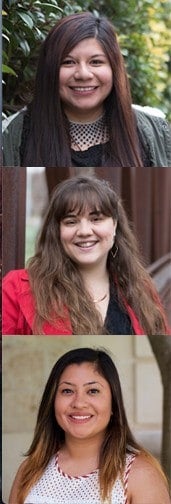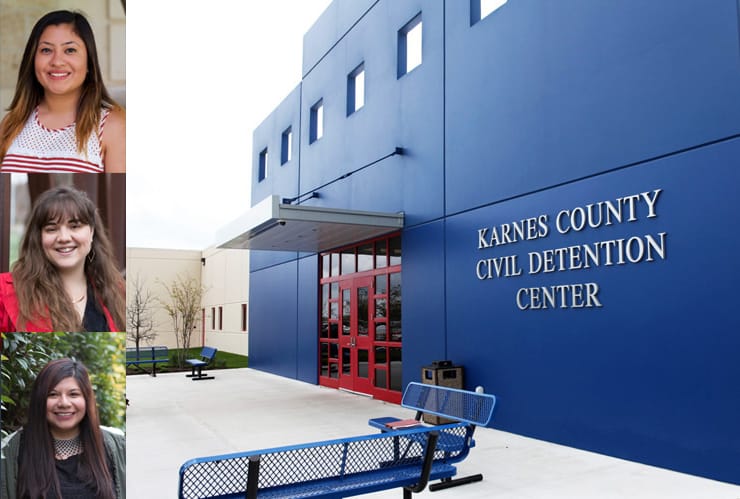Last fall, after a long day at the Karnes County immigrant detention center prepping asylum-seekers for their credible fear interviews, a group of UT Austin social work and law students piled into a van.
They spent the two-hour drive back to Austin debriefing the experience: some wanted to talk about worries they had for their clients while others needed to express feelings of sadness or anger after hearing about traumatic experiences. An hour into the conversation, a law student asked, “Can we always come with social work students?”

In 2017, students from the Steve Hicks School of Social Work joined for the first time students from the UT Austin School of Law’s Immigration Clinic who were visiting the immigration detention center in Karnes City, Texas. Together, these students help asylum-seekers prepare for their credible fear interviews, which immigration officials use to determine if there is a “significant possibility” that detained immigrants would be in danger if returned to their home countries. During these interviews, asylum-seekers have to recount traumatizing and violent experiences — like gang violence or domestic abuse — that they may have not processed yet. If their stories have discrepancies, they could fail the interviewed and be deported. During their visits to Karnes, law and social work students help detained immigrants process their traumatic experiences and create a cohesive narrative in preparation for the interview.
Among the social work students who have been visiting Karnes are Ana Hernandez, Anayeli Marcos, and Dora Gonzalez, all in the master’s program. The three were drawn to this collaboration with the UT School of Law because of their ongoing work with immigrant populations and the possibility of using their bilingual skills.
Hernandez said the collaboration is beneficial for everyone involved: social work students learn from the legal expertise of law students while providing validation to their work and helping detainees process their experiences.
“Even having that debrief in the van on the way back is a service we’re able to provide to law students,” Hernandez said. “That student who asked if we could always come was validating our skill set to be able to go into a detention facility and connect with people on an emotional level.”
Marcos said that law students are not always necessarily trained in speaking to clients who have experienced trauma, and that their straight-to-point approach can come off as cold. To get the information that law students need, Marcos said, social work students build trust by operating sensitively and listening with empathy.
“We are not the expert in the client’s experiences, they are,” Marcos said. “We basically just guide them through their story. They know their story best, and we’re just there to help them frame their it for their credible fear interview.”
The collaboration with the law school has shown that social work pairs well with other fields, Gonzalez said.
“It’s really given me the opportunity to work with lawyers and legal assists to learn where they come from and complement the work they do,” Gonzalez said. “They are very competent at what they do, and we are able to help them have conversations that are really traumatizing or heavy.”
In addition to their monthly work in Karnes, all three students also facilitate weekly group-therapy sessions through the Young Women’s Christian Association of Greater Austin for the female immigrants detained at the T. Don Hutto Residential Center in Hutto, Texas.
The two detention center initiatives offer different kinds of social services, Hernandez explained. While the work at the Karnes facility is more about crisis intervention, the support group in Hutto provides therapeutic support through breathing exercises and craft activities.
At Hutto, the goal is to build human connection among women who are detained for long periods of time — from 8 months to a year. Unlike the detainees at the Karnes facility, most of the women detained in Hutto came to the United States alone. Detainment can be an extra-isolating experience for them, Hernandez said.
“When you are in a space where you often times don’t have family members that can come to see you, just having other human beings come in and share space with you and show genuine interest in your life can be really powerful,” Hernandez said.
She added that the detainees have provided positive feedback about the experience, and that they have been able to connect with each other by identifying what they share in common regardless of differences in language, culture, or country of origin. During a recent session, one woman from El Salvador expressed that she never imagined she would find such a good friend in a fellow detainee from Honduras.
Gonzalez said that her social work education has equipped her with a strong ability to listen actively during the difficult conversations she often has in the immigration detention centers. She said this is a crucial skill for giving ownership and validation to another person and their narrative.
“These are individuals who are most times only half-listened to, or don’t feel like they’re being heard,” Gonzalez said. “As soon as you walk into detention center, it overwhelms you with restriction; it’s such a restrictive environment. So when you give these people a space to be honest and open to who they are, it creates a better dynamic for them.”
And just as they do with law students coming from Karnes City, the three students have debriefing sessions during the weekly car ride back from Hutto.
“Processing after we have finished our work has been very helpful because a lot of these clients tell you very sad and traumatic things that have happened in their lives,” Marcos said. “I think that talking about our experiences as volunteers that go into these very oppressive spaces really helps us as a team and allows us to grow together.”
By Lynda Gonzalez. Posted February 20, 2018.


